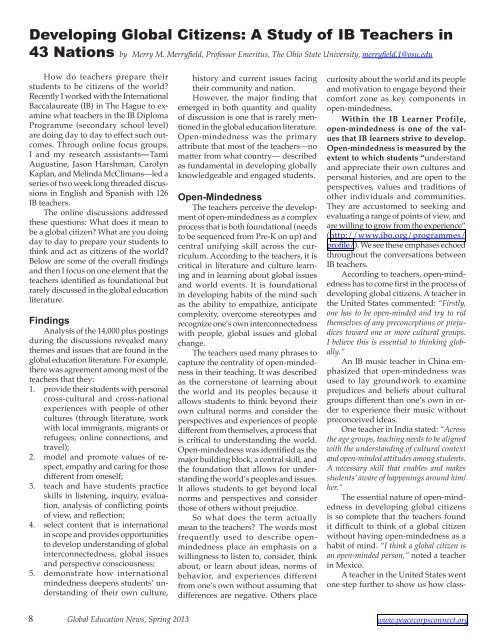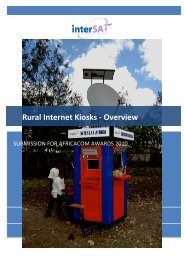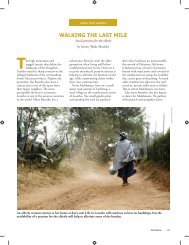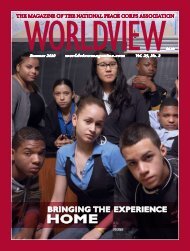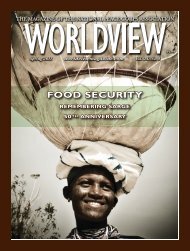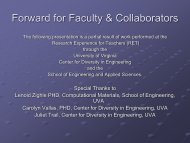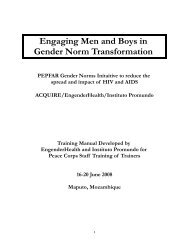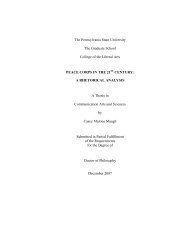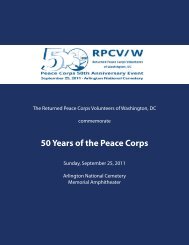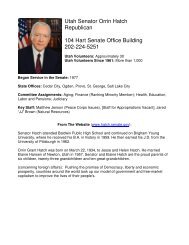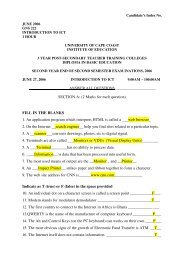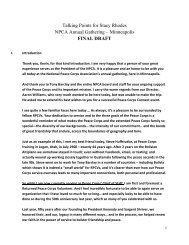Spring - National Peace Corps Association
Spring - National Peace Corps Association
Spring - National Peace Corps Association
You also want an ePaper? Increase the reach of your titles
YUMPU automatically turns print PDFs into web optimized ePapers that Google loves.
Developing Global Citizens: A Study of IB Teachers in<br />
43 Nations by Merry M. Merryfield, Professor Emeritus, The Ohio State University, merryfield.1@osu.edu<br />
How do teachers prepare their<br />
students to be citizens of the world<br />
Recently I worked with the International<br />
Baccalaureate (IB) in The Hague to examine<br />
what teachers in the IB Diploma<br />
Programme (secondary school level)<br />
are doing day to day to effect such outcomes.<br />
Through online focus groups,<br />
I and my research assistants—Tami<br />
Augustine, Jason Harshman, Carolyn<br />
Kaplan, and Melinda McClimans—led a<br />
series of two week long threaded discussions<br />
in English and Spanish with 126<br />
IB teachers.<br />
The online discussions addressed<br />
these questions: What does it mean to<br />
be a global citizen What are you doing<br />
day to day to prepare your students to<br />
think and act as citizens of the world<br />
Below are some of the overall findings<br />
and then I focus on one element that the<br />
teachers identified as foundational but<br />
rarely discussed in the global education<br />
literature.<br />
Findings<br />
Analysis of the 14,000 plus postings<br />
during the discussions revealed many<br />
themes and issues that are found in the<br />
global education literature. For example,<br />
there was agreement among most of the<br />
teachers that they:<br />
1. provide their students with personal<br />
cross-cultural and cross-national<br />
experiences with people of other<br />
cultures (through literature, work<br />
with local immigrants, migrants or<br />
refugees, online connections, and<br />
travel);<br />
2. model and promote values of respect,<br />
empathy and caring for those<br />
different from oneself;<br />
3. teach and have students practice<br />
skills in listening, inquiry, evaluation,<br />
analysis of conflicting points<br />
of view, and reflection;<br />
4. select content that is international<br />
in scope and provides opportunities<br />
to develop understanding of global<br />
interconnectedness, global issues<br />
and perspective consciousness;<br />
5. demonstrate how international<br />
mindedness deepens students’ understanding<br />
of their own culture,<br />
history and current issues facing<br />
their community and nation.<br />
However, the major finding that<br />
emerged in both quantity and quality<br />
of discussion is one that is rarely mentioned<br />
in the global education literature.<br />
Open-mindedness was the primary<br />
attribute that most of the teachers—no<br />
matter from what country— described<br />
as fundamental in developing globally<br />
knowledgeable and engaged students.<br />
Open-Mindedness<br />
The teachers perceive the development<br />
of open-mindedness as a complex<br />
process that is both foundational (needs<br />
to be sequenced from Pre-K on up) and<br />
central unifying skill across the curriculum.<br />
According to the teachers, it is<br />
critical in literature and culture learning<br />
and in learning about global issues<br />
and world events. It is foundational<br />
in developing habits of the mind such<br />
as the ability to empathize, anticipate<br />
complexity, overcome stereotypes and<br />
recognize one’s own interconnectedness<br />
with people, global issues and global<br />
change.<br />
The teachers used many phrases to<br />
capture the centrality of open-mindedness<br />
in their teaching. It was described<br />
as the cornerstone of learning about<br />
the world and its peoples because it<br />
allows students to think beyond their<br />
own cultural norms and consider the<br />
perspectives and experiences of people<br />
different from themselves, a process that<br />
is critical to understanding the world.<br />
Open-mindedness was identified as the<br />
major building block, a central skill, and<br />
the foundation that allows for understanding<br />
the world’s peoples and issues.<br />
It allows students to get beyond local<br />
norms and perspectives and consider<br />
those of others without prejudice.<br />
So what does the term actually<br />
mean to the teachers The words most<br />
frequently used to describe openmindedness<br />
place an emphasis on a<br />
willingness to listen to, consider, think<br />
about, or learn about ideas, norms of<br />
behavior, and experiences different<br />
from one’s own without assuming that<br />
differences are negative. Others place<br />
curiosity about the world and its people<br />
and motivation to engage beyond their<br />
comfort zone as key components in<br />
open-mindedness.<br />
Within the IB Learner Profile,<br />
open-mindedness is one of the values<br />
that IB learners strive to develop.<br />
Open-mindedness is measured by the<br />
extent to which students “understand<br />
and appreciate their own cultures and<br />
personal histories, and are open to the<br />
perspectives, values and traditions of<br />
other individuals and communities.<br />
They are accustomed to seeking and<br />
evaluating a range of points of view, and<br />
are willing to grow from the experience”<br />
(http://www.ibo.org/programmes/<br />
profile/). We see these emphases echoed<br />
throughout the conversations between<br />
IB teachers.<br />
According to teachers, open-mindedness<br />
has to come first in the process of<br />
developing global citizens. A teacher in<br />
the United States commented: “Firstly,<br />
one has to be open-minded and try to rid<br />
themselves of any preconceptions or prejudices<br />
toward one or more cultural groups.<br />
I believe this is essential to thinking globally.”<br />
An IB music teacher in China emphasized<br />
that open-mindedness was<br />
used to lay groundwork to examine<br />
prejudices and beliefs about cultural<br />
groups different than one’s own in order<br />
to experience their music without<br />
preconceived ideas.<br />
One teacher in India stated: “Across<br />
the age groups, teaching needs to be aligned<br />
with the understanding of cultural context<br />
and open-minded attitudes among students.<br />
A necessary skill that enables and makes<br />
students’ aware of happenings around him/<br />
her.”<br />
The essential nature of open-mindedness<br />
in developing global citizens<br />
is so complete that the teachers found<br />
it difficult to think of a global citizen<br />
without having open-mindedness as a<br />
habit of mind. “I think a global citizen is<br />
an open-minded person,” noted a teacher<br />
in Mexico.<br />
A teacher in the United States went<br />
one step further to show us how class-<br />
8 Global Education News, <strong>Spring</strong> 2013 www.peacecorpsconnect.org


